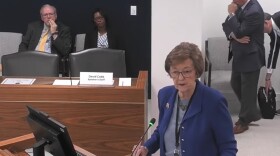North Carolina lawmakers start a new legislative session this week at a time when partisanship and bitterness nationwide have reached a peak.
After rioters stormed past federal police on Capitol Hill last Wednesday and delayed the congressional certification of Joe Biden's electoral victory over President Donald Trump, the Democratic leader in the state House said he got more than a hundred texts and 17 voice mails. In their messages, Rep. Robert Reives II said his friends, family and legislative staff worried there could be similar unrest in Raleigh.
But asked whether the rioting in Washington could actually help promote civility at the North Carolina General Assembly, after some thought, Reives said yes.
"And both of us, on both sides of the aisle, understand that the demonizing of people who have different political beliefs, who have different policy beliefs, ultimately doesn't do us any good," Reives added.
Reives was recently selected as House Minority Leader. He succeeds Darren Jackson, who stepped down following a rough November election that saw Republicans sweep statewide judicial races, win a majority of Council of State positions and pick up seats in the North Carolina House. Gov. Roy Cooper has since appointed Jackson to fill a vacancy on the North Carolina Court of Appeals.
Cooperation on COVID relief; a pause in partisanship
Partisan rancor has been fairly common in the state Legislature.
Democrats, led by the governor, have persistently called for expanding Medicaid coverage for low-income families and higher pay raises for teachers and other public school workers.
2019 came and went without a comprehensive budget plan because the two parties couldn't come to terms and Republicans didn't have the numbers to override the Cooper's veto. So, lawmakers settled on mini spending plans to cover the bases just as COVID-19 was about to rock the country.
But Reives said he thinks cooperation on COVID relief legislation last year provided an important model for the upcoming session.
"For once, we weren't in there fighting each other and screaming about stuff and ignoring each other," he said.
Reives also said it doesn't hurt that Cooper can't run again in four years, therefore Republicans might be less concerned about depriving him of any big political victories.
The old stalemate over Medicaid expansion
The Democratic leader now sees the potential for common ground on Medicaid expansion, a cause in which some House Republicans have shown interest.
But Republicans might be less inclined to negotiate than Reives hopes.
"Not one issue should ever hold up a state budget, period," said House Majority Leader John Bell, referring to Democrats' firm stance on the need to expand Medicaid coverage. "I firmly believe that."
Like his Democratic counterpart, Bell said the altered political landscape in Raleigh could facilitate more willingness to negotiate but he clearly believes the onus is on the Democrats to come around.
"We need three Democrats to cross over and override a veto in the House now, compared to we had to have seven before," Bell noted, adding he believes Republicans can find three moderate Democrats to defect and back a GOP spending plan if one is vetoed by the governor.
Bell said there's still no appetite in his caucus for expanding Medicaid. But Bell insisted that doesn't mean Republicans don't want to address health care access.
"And if we could look at ways to expand telehealth, and look at the associated health care plans, look at reducing barriers for rural North Carolinians to access care, how we put more providers in these rural communities," Bell said. "These are all areas that I think we can have great bi-partisan support on."
Potential for cooperation on broadband and criminal justice
Both Bell and Reives agreed there was lots of potential for cooperation on expanding rural broadband access and on police and criminal justice reform.
"Chokeholds, things of that sort, that we need to start doing something about those," said Reives.
For Bell, he would like to see lawmakers take steps to make sure state licensing rules do not prevent felons who have paid their debt from pursuing gainful employment.
"The best way to reform somebody is to get them a job and let them move on with their life and not get into the rut they were stuck in before," Bell said.
Looming tensions
But there are storm clouds on the horizon. Republicans will resume efforts to implement a photo ID requirement for voters, a highly contentious issue currently bound up in litigation.
A 2013 Republican-backed photo ID law was struck down by a federal court for its discriminatory impact on Black voters. Safeguarding voting rights was just one of the social justice issues to spark the Moral Monday protests at the Legislature.
"It is my hope that, you know, we will not see that this coming session," said Bell, referring to the raucous rallies at the General Assembly that resulted in mass arrests of people engaging in civil disobedience.
Bell's hope may be in vain, especially with a new round of post-census redistricting starting later this summer.











